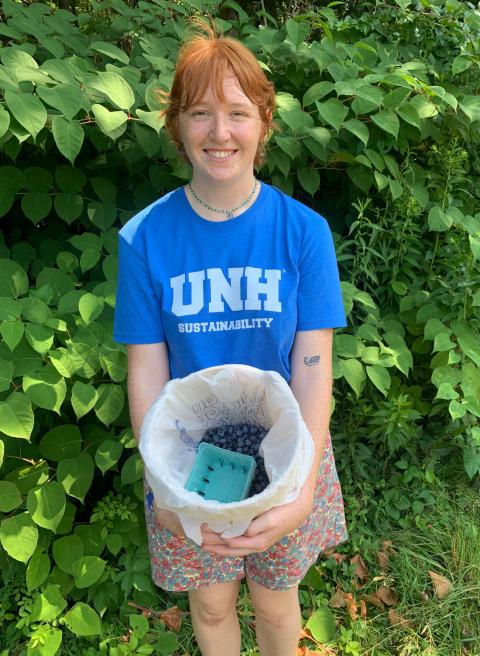
Madelyn Bradley is an environmental and resource economics major from Wakefield, R.I. who was awarded a sustainability fellowship by the UNH Sustainability Institute. This summer, along with completing her fellowship at Resilient Buildings Group, she also learned how to make homemade pickles.
Madelyn Bradley: I applied for the Sustainability Fellowship because it looked liked a great opportunity to get my hands dirty in the field of sustainability. In preparation to entering my senior year I knew I wanted a unique experience that would give me insight into what my future career could look like. After attending the Fellowship's info session, I was able to gauge that being part of this program would provide a challenging yet fulfilling experience.
Madelyn: This summer my project focused on promoting energy efficiency within the food service industry to help generate resilience for small to medium businesses. My fellowship took place at Resilient Buildings Group, in Concord, New Hampshire, which is a mission driven firm that specializes in energy efficiency.
For my project, I utilized the NHSaves program, a collaboration of the state's utility companies that provides incentives for energy efficiency equipment, to achieve my mission. My responsibilities included creating educational and marketing content on behalf on the program, direct outreach to restaurants and other food service establishments, conducting financial analyses of energy efficient equipment, and establishing relationships with trade associations within the industry.
Madelyn: Since this industry has high operating costs and thin profit margins, I hope to provide them relief and help them become more resilient to increasing energy prices while also becoming more sustainable. During this experience I would like to have a positive impact on the foodservice industry by helping them reduce the financial burden of high energy expenses and aid in reducing their carbon footprint.
Madelyn: I think that this experience will teach me how energy efficiency contributes not only to reducing Carbon emissions, but also how it helps achieve other goals of sustainability. I also think that it will give me inspiration to continue being an active contributor to the sustainability field to be apart of the solution for a bright and equitable future.
Learn more
Madelyn: To me, the term sustainability is very powerful can take on a variety of definitions. I believe that sustainability can be a word to explain the forward-thinking strategies and collaborations that occur to create a high quality of life for all. It can be used to describe the safe and healthy environment that we want to create for future generations to be able thrive. What both of these definitions hold in common is that they both aim to achieve their goals ethically and responsibly with the intention of leaving our planet better than we found it.
Madelyn: I think that UNH is honorable for putting their lesson plans and research into practice on campus. In my classes, professors have encouraged me to connect sustainability with my other academic pursuits, which has challenged me to be innovative and forward thinking in my work. More importantly, UNH invests a lot in sustainability beyond the classroom and integrates sustainable practices throughout their campus. This is a key component because it provides real life examples of what the future could look like and to vitalize the campus community to keep exploring new methods to achieve the vision of sustainability.